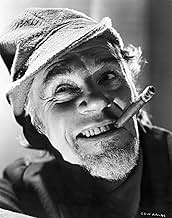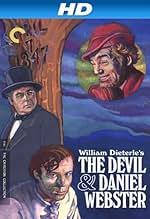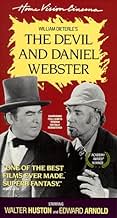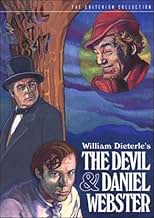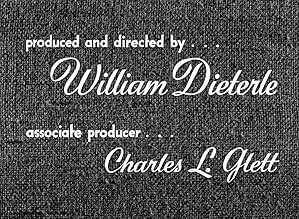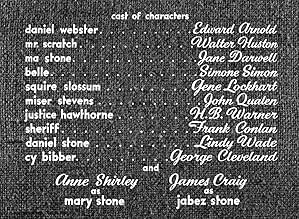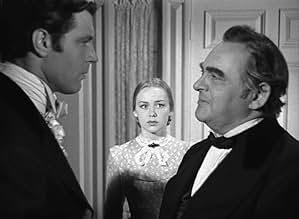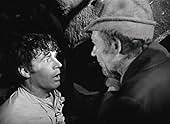A struggling farmer in 1840 New Hampshire makes a pact with Satan for economic success, then enlists famed orator Daniel Webster to extract him from the consequences of his contract.A struggling farmer in 1840 New Hampshire makes a pact with Satan for economic success, then enlists famed orator Daniel Webster to extract him from the consequences of his contract.A struggling farmer in 1840 New Hampshire makes a pact with Satan for economic success, then enlists famed orator Daniel Webster to extract him from the consequences of his contract.
- Won 1 Oscar
- 2 wins & 1 nomination total
- Spectator
- (uncredited)
- Hank
- (uncredited)
- Poker Player
- (uncredited)
- Woman
- (uncredited)
- Martin Van Buren Aldrich
- (uncredited)
Featured reviews
One word - "fantasy". It's my favorite movie category, and this is the best one that I've ever seen. The 1940s was the decade in which horror melodramas and fantasies really began to ramp up, and this movie helped to set the standard. Stephen Vincent Benet's story is a bit changed, but not enough to diminish this American Gothic tale.
Aside from being superior entertainment, the movie simply has no weaknesses. Where to start? The casting and acting are extraordinary. Though both are most often remembered for other movies, Edward Arnold and Walter Huston turn in their best performances here. Simone Simon (known today for the "Cat People" movies) is exceptional as Belle. Anne Shirley, James Craig, and the stellar supporting cast are also great.
This is Bernard Herrmann's best film score. William Dieterle's direction is quirky and involving, propelling the film along at a fast clip. Admittably, the characters are caricatures, but Dieterle helps us to feel their trials and tribulations. The movie also features brilliant cinematography, exceptional production values, and truly superior editing (this was an early job for director Robert Wise). The scenes are quite stagey, but never disjointed - the logic of the story is unmistakable and riveting.
Huston is the ultimate "Mr. Scratch". I've seen this show many times, and it's a 10/10.
The devil then uncovers a buried treasure of Hessian gold and from that moment on, Stone prospers (to the detriment of his friends and neighbors). Local politician Daniel Webster (Edward Arnold) is godfather to Stone's new baby and passes thru town regularly to socialize and imbibe with the locals. When the due date for reaping his soul arrives, it's to Webster that Stone turns to argue his way out of going to Hades for all eternity in a supernatural courtroom scene with famous disgraced and dishonored Americans - themselves in Hades - as the jury.
William Dieterle's nearly surrealistic settings and camera work (by Joseph August) add just the right touch of menace and fantasy to the stark New Hampshire settings. Simone Simon plays a seductive assistant of the devil whose purpose is to keep Stone's heart and attention away from his timid yet insightful wife who might somehow set him back on the right path.
Walter Huston was Oscar nominated for his performance as the devil and Edward Arnold plays Webster as big as all outdoors - a man with appetites and a love of life to match his girth. New England is portrayed as a rural place not too far from its Puritan roots.
Made in 1941, and dealing in themes of religion and patriotism, it might have been a shrill production had it been made any later once the war years had lots of films getting heavy handed when dealing with either of those subjects.
This classic fantasy based upon the legend of Faust is adapted from the story by Stephen Vincent Benet. The movie is very persuasively made , usually rise to a crescendo of emotion.Entertaining fantasy is visually striking with Walter Huston in a rare and successful comic role as sympathetic Devil. Film contains marvelous performances by main cast and secondaries actors such as Gene Lockhart, John Qualen,HB Warner,Jane Darnwell Simone Simon as a witch ad Jeff Corey appears uncredited.This cult fantasy drama is a sometimes uneven, but throughly funny and amusing recounting of the Faustian tale.
This delicate fantasy about a farmer who gradually realizes that has been deceived by the Devil has very evocative black-and white cinematography by Joseph August, Dieterle's usual and he photographed 'Portrait of Jennie'.The film won Oscars 1941 for original dramatic score by Bernard Herrmann. The motion picture is well directed by William Dieterle as a classic example of drama/comedy/fantasy of the 40s. Dieterle is a German director who was in Hollywood by 1930s and directing dramas(Scarlet down,Fog over Frisco,Fashions), costumer(Hunchback of Notre Dame,Kismet,Omar Khayyan) and biopics experts(Life of Emile Zola,Dr Ehrlich, Juarez, Madame Curie,Reuter) that were a revelation at the box-office.
What seemed startling in 1941 feels mostly creaky by today's standards, but there are still some fresh moments of film making in this one. William Dieterle was obviously open to experimentation when it comes to the use of cinematography and sound, and the movie has a striking visual look. The plot is mostly connect the dots, and there are no real surprises, but I don't know that one watches a morality tale for surprises in the first place.
Walter Huston is extremely creepy as the Devil (aka Mr. Scratch). He received a Best Actor Academy Award nomination for his performance even though, based on sheer screen time, he really has more of a supporting role. But he's so effective when on screen that his presence dominates the film even when he's physically absent, which probably accounts for the lead nomination.
Edward Arnold is pretty good too as Daniel Webster. Also standing out is Jane Darwell (Ma Joad in "The Grapes of Wrath") as a hardened farm mother.
Parts of this film have a wicked sense of humour, which I thoroughly enjoyed. The trial at the end (with a literal jury of the damned), is especially amusing.
On a sidenote, the film was successful in capturing the 1941 Academy Award for Best Dramatic Score.
Don't expect to see any points made that haven't already been made a thousand times in a thousand other movies, but enjoy the originality of the film technique on display.
Grade: A-
Did you know
- TriviaWilliam Dieterle had a habit of directing with white gloves on. Robert Wise said that everyone thought it was because he had a germ or dirt phobia. During shooting of one scene, Dieterle noticed there wasn't enough mud on a carriage wheel. He pulled off his gloves, grabbed some mud, rubbed it onto the wheel, then wiped his hands on his pants and put the gloves back on to continue directing.
- GoofsShortly after filming had begun, Thomas Mitchell fractured his skull and was replaced by Edward Arnold. Not many scenes had been shot, none were reshot, so Mitchell is still visible in some scenes. [Note: entries in the Trivia section indicate that all of Mitchell's scenes were reshot.]
- Quotes
Mr. Scratch: You shall have your trial, Mr. Webster. But I'm sure you'll agree, this is hardly the case for an ordinary jury.
Daniel Webster: Let it be the quick or the dead, so long as it is an American judge and an American jury!
Mr. Scratch: 'The quick or the dead!' You have said it.
[he stomps on the barn floor; a door opens]
Mr. Scratch: You must pardon the leathery toughness of one or two.
Jabez Stone: [afraid] Mr. Webster!
[a line of ghosts begin entering from the trapdoor]
Mr. Scratch: Captain Kidd - he killed men for gold. Simon Girty, the renegade - he burned men for gold. Governor Dale - he broke men on the wheel. Asa, the Black Monk - he choked them to death. Floyd Ireson and Stede Bonnet, the fiendish butchers. Walter Butler, King of the Massacre. Big and Little Harp, robbers and murderers. Teach, the Cutthroat. Morton, the vicious lawyer... and General Benedict Arnold. You remember him, no doubt.
Daniel Webster: A jury of the damned...
Mr. Scratch: [laughs] Dastards, liars, traitors, knaves. Your suggestion, Mr. Webster - 'the quick or the dead.'
Daniel Webster: This is outrageous, I asked for a fair trial...
Mr. Scratch: Americans, all.
- Crazy creditsFor some prints released under the title "The Devil and Daniel Webster", the opening credits start with the phrase "in front of the camera..." followed by a list of names only of the primary cast (no character names) and then the phrase "in back of the camera..." followed by a list of names only of the primary production crew, without their job roles, ending with the phase "all collaborated on the picture...." Then the title card is shown, with a story credit to Stephen Vincent Benet, and the note "this picture was originally shown with the title 'all that money can buy'." The title card is all in lower case. Finally, the opening prologue is shown as noted in another crazy credit item.
- Alternate versionsOver the years, this film was re-released more than once, partly because of its poor box office, and gradually cut down to 85 minutes. It remained in this form for many years, until it was recently restored to its full length. When this was done in the 1990s, it was unfortunately all too easy to tell which sections are restored... all the footage from the 85 minute version was in absolutely pristine, mint condition, while the long-lost, formerly missing footage has less than perfect sound and picture quality. However, the quality has been considerably improved on the DVD and on recent TV showings.
- SoundtracksCome, Ye Thankful People, Come
(uncredited)
Music by George J. Elvey
Lyrics by Henry Alford
- How long is The Devil and Daniel Webster?Powered by Alexa
Details
- Runtime
- 1h 47m(107 min)
- Color
- Aspect ratio
- 1.37 : 1


